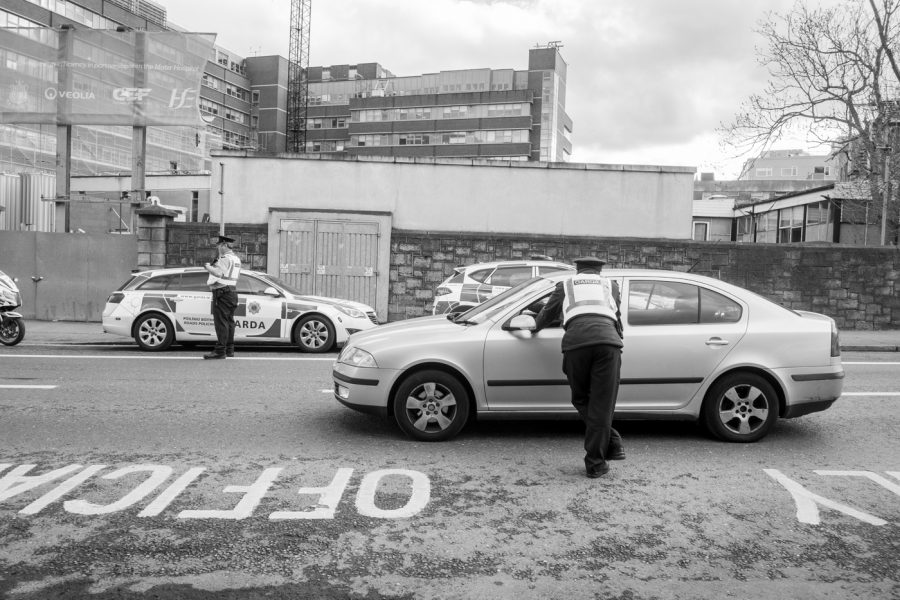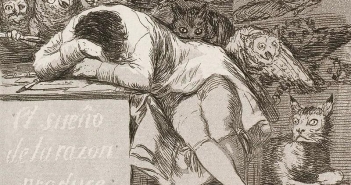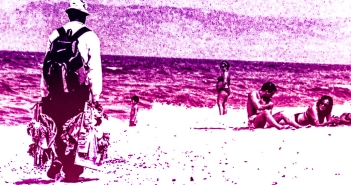With lockdown actively under consideration in some European states once again, including Ireland, we look back on a selection of testimonies from a period many of us thought we had put behind us.
It all happened too fast, so quickly that we didn’t have time to fully understand. The night before we were sipping beer and eating tapas and waiting for spring to come in the warm evening breeze; the following day we were on the sofa consulting the Netflix schedule for the umpteenth time, without finding an entirely satisfactory choice.
Diego Pugliese, ‘Barcelona Under Lockdown’, April 3rd, 2020.
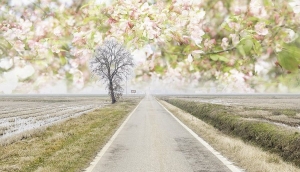
Image (c) Daniele Idini
Our bodies, already weakened by sedentary lifestyles, are becoming weaker, muscle-mass decreasing quickly through lack of exercise. We do what we can, setting up home gyms, doing yoga in our bedrooms, a few push ups in the morning. No running, swimming, no going for walks; hardly breathing in the fresh air, panting, moving, or sweating. I do a little gardening in pots on the balcony, which I hadn’t done before. All of a sudden tomato seeds seemed the most important item on my shopping list during my weekly, stressful visit to the supermarket.
Silvia Panizza, ‘Under Lockdown in Piedmont’, April 6th, 2020.
We can have a gnawing sense that our civilisation got things wrong, that it is being, somehow, punished. A year ago I heard a retreat-giver say that we had lost the ability to read the signs of the times. We had belonged, or thought we belonged, on a planet that although under threat, and although subject to disaster more or less randomly distributed, was broadly on a path of progress, of improvement, even for under-developed regions. Nature mostly provided balance and harmony.
Modern science reinforces this optimism at the cosmic level. We now know that the total universe that includes our Milky Way as one of nearly a hundred million galaxies has been expanding since the Big Bang. But if the rate of its expansion had been even a millionth of a percent slower, the whole thing would have collapsed, imploded in upon itself. There was fine tuning. Now trust is at issue with a particularly severe jolt for the Western world. It could be said that most of our strategies of coping are in the nature of distraction. To the extent this is so, the underlying unease remains. Call it dis-ease in fact.
Fergus Armstrong, ‘A Voice from the Cocoon’, April 17th, 2020.
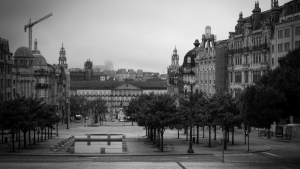
Image (c) Felipe Monteiro
What I, other immigrants, and the Portuguese hope is that we can return to the life we had before, and be able to leave this prison, without bars, that our homes have become. While we try to renew ourselves, the city is still and visibly lacking the energy and joy of the local population.
What is most intriguing in this situation, at least for me, is that we are trying to reinvent ourselves. For example, I have started to cook a lot more during these days of confinement, learning new recipes, in addition to adapting the house for new activities we never used to do at home, like dancing and exercising.
Despite everything I believe that together we will overcome this difficulty, which is happening on a a global scale; staying at home admiring the birds and their songs that echo along with an inaudible cry for freedom from the citizens.
Felipe Monteiro, ‘Porto Under Lockdown’ April 17th, 2020

Dmytro Sidashev / Alamy Stock Photo
I had booked a hotel – but ended up alongside five families living in a large apartment for seven days. Only two of us were allowed outside to buy food – everyone else had to stay inside. Before leaving we were covered head-to-toe, in gloves, face masks and head coverings. On our return we went through elaborate cleaning procedures before re-entering the apartment. We had to remove our ‘outside’ clothing and spray everything with 75% alcohol.
No cars with registrations from outside the capital city were allowed in. The schools were on holiday and due to return the first week in March but are still closed all over China. Only students doing important exams at the end of term will be allowed to return initially, which hasn’t happened yet.
Leaving Beijing, I returned to my home city of ****. You are supposed to scan your phone so they can track potential carriers arriving into the city – which I hadn’t, having used a private firm for the airport collection. This meant my car registration didn’t show up on the cameras. So the next day the authorities were in touch to find out how I made it back from the airport.
Tobias Easterby, ‘China Under Lockdown: Another Cultural Revolution?’ April 19th, 2020
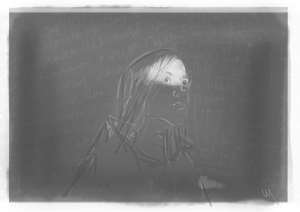
Illustration by Malina Molenda/Artsyfartsy for Cassandra Voices
What if I had to take care of my little ones? While my mom goes outside to try and bring a little money in. What if she loses her job because of the pandemic? Then our only source of sustenance would be gone. Then we would be relying on the government even more than what we were doing before. What do you call that? Resting on the government? Relaxing on the government? Maybe even sleeping on the government because of the sheer amount of people whose lives were turned upside down because of it. As if living life sideways was any easier.
Elizabeth Ekinwande, ‘Leaving Certificate Under Lockdown’, April 19th, 2020.
The Swedish approach to the Covid-19 pandemic is a sign of underlying differences in how they understand morality in the public sphere, and how they relate with each other: this comes from a more utilitarian perspective.
Utilitarianism has earned a bad reputations as it has been incorrectly conflated with crude capitalism, when it is really about taking peoples’ wellbeing seriously, or ‘the greatest happiness of the greatest number.’ As Jeremy Bentham and John Stuart Mills understood it, utilitarianism is extremely equalitarian .
Notably, the Swedish government has taken the advice of moral philosophers who come from a moral utilitarian perspective. The core difference between their approach and what we are seeing for the most part elsewhere is they attempt to avoid an understandable reaction to save lives immediately. They put aside an emotional response and consider the future consequences.
William Smith, ‘Covid-19: ‘A View from Sweden’, April 25th, 2020.

Image (c) Daniele Idini
Across the hall, the atmosphere is suddenly lifted by the wit and humour of a ninety-odd year-old who has somehow escaped the dementia and delirium that pervades here. Unlike his fellow residents, this is a man who never wears his breakfast and is more recognisable to me in crisp shirt and tie, top button fastened. When we first met some months ago I doubted his cognition on hearing him shouting instructions to ‘Alexa’ across the room, but it turns out that I was the one that was out of touch. I look at his records – not for resuscitation, not for transfer. Despite his joviality, the oxygen levels already look poor. Given that it is still early on in the course of his infection, it is only a matter of time before he will crash and be gone.
As the nation scrambled to prepare itself for the deluge of demand on ventilators, this was the kind of man who was never to have been deemed eligible. Yet in spite of the full newspaper spread photos of busy intensive care units, I know there is room for him, and that he has the will to live. Despite his age, were he to defy the admittedly poor odds, he has a quality of life to return to. We embark on the conversation that echoes a distant role-play from medical training which treads gently but directly on taboo. How is it you wish to die, and what interventions might be acceptable or worthwhile to try to prevent that?
Anonymous Doctor, ‘Diary of a Pandemic Doctor: Nursing Home Chaos’, April 26th, 2020.
Fear plays a major role in influencing the decisions we make and the actions we engage in. Research has shown that there are sound evolutionary reasons for this. The selection pressures from these types of danger have resulted in domain-specificity in the reactivity of the fear system, meaning that the system has evolved special sensitivity toward such dangers. However, ‘not all human fears are instinctual and hardwired—we need to learn what to be afraid of.’ [i]While this capacity is critical in helping humans deal with the different environments in which they find themselves and which present different sources of ‘danger’, it can also be abused by those seeking to advance their own interests at our expense.
Justin Frewen, ‘Fear and Loathing in the time of Covid-19’, May 14th, 2020

Image (c) Conor Blennerhassett
The resorts of Magaluf, Palmanova and Santa Ponça on the southwest coast of Mallorca are among the island’s most popular destinations. By May, they are usually heaving with a mix of young families, pensioners and stag and hen parties – all availing of cheaper low season prices and temperatures in the high 20s and even low 30s.
Conor Blennerhassett, Photo Essay: Mallorca After the Pandemic, May 26th, 2020

